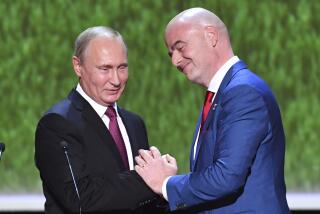European Government Seeking to Give Soccer Players More Freedom
- Share via
BRUSSELS, Belgium — While the European public complains about the salaries of high-paid soccer stars, politicians are trying to help the players at the bottom of the pay scale by creating an open market.
Parliamentarians of the 12-nation European Economic Community recently called soccer’s trading system, where clubs “own” players and get huge sums for their transfers, “a latter-day version of the slave trade.”
The EEC wants to create an open market where players from within the community are free to play anywhere in the community without transfer fees.
“Don’t look at a handful of soccer millionaires but at all the players who hover around the minimum income,” said Dutch Europarliamentarian James Janssen Van Raay, who helped push the soccer transfer report through the EEC parliament this month.
“They have the problems,” he said. “If these 80% play no more soccer, then there are no more leagues.”
Without these players, who rarely make the headlines, “it is all finished,” Van Raay said.
The parliament said soccer players are held hostage by clubs who can decide their future even after contracts expire. The clubs can refuse a transfer to another team, where a player might find better wages or working conditions.
“What is incredible is that we see that some clubs maintain they are the owners of players,” said Belgian parliamentarian Roger Blanpain. “Now, property of players is a form of slavery that should have been abolished long ago,” he said.
The ruling body of European soccer, UEFA, wants to keep Europe’s most popular sport as it is currently played, limiting foreigners in national leagues and giving clubs extensive powers to decide the career of their players beyond the duration of contracts.
“We have to protect our capital. And that, after all, is the players,” said Michel Verschueren, manager of Anderlecht, one of Belgium’s and Europe’s top teams, in a recent article to argue for extensive club interference.
“Once a contract has expired, then there is no reason whatsover why a club should should still have rights to a player,” Blanpain countered.
A change in the transfer rules would affect the game from the lowest level of professional play to the reaches of Dutchmen Ruud Gullit and Marco Van Basten, who were voted the best players at last year’s European Championships.
UEFA contends it would upset the way business is done and wreak havoc in the clubs’ balance sheets. It says teams would no longer want to invest time and money in youngsters since they would no longer control their future.
The European Parliament would like to abolish the current transfer system, with financial guarantees for clubs training young players.
Since the parliament has few powers, it asked the EEC’s executive Commission April 11 to take action against the current transfer system. The Commission prefers a cautious approach and only a gradual change.
UEFA says the EEC rules do not apply to the Bern-based organization, which has 34 members throughout Europe, since Switzerland is not part of the trade bloc.
Until the EEC and Uefa discuss the situation, van Raay said, players continue to suffer and are subject to the whims of autocratic club presidents.
For many of the top stars, however, life is very different.
Many of the foreign stars playing in Milan and northern Italy live a life of luxury in villas overlooking the lakes of Como and Varese. Gullit can make up to $900,000 a year and Van Basten slightly less, depending on their performance bonuses. Leading stars in Spain and West Germany are almost as opulent.
“The world only writes about the prima donnas, not about the choir singers,” Van Raay said.
More to Read
Go beyond the scoreboard
Get the latest on L.A.'s teams in the daily Sports Report newsletter.
You may occasionally receive promotional content from the Los Angeles Times.






